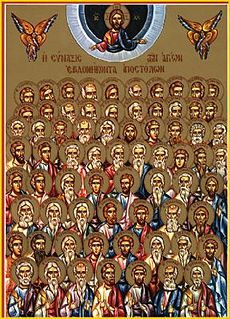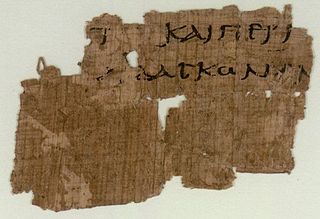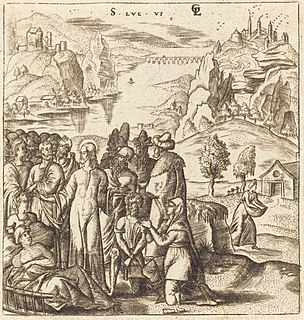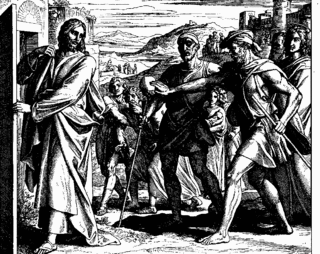Related Research Articles

The Parable of the Talents is one of the parables of Jesus. It appears in two of the synoptic, canonical gospels of the New Testament:

The seventy disciples or seventy-two disciples, known in the Eastern Christian traditions as the seventy apostles or seventy-twoapostles, were early emissaries of Jesus mentioned in the Gospel of Luke. The correct Greek terminology is evdomikonta (εβδομήκοντα) apostoli or evdomikonta mathetes.

Matthew 4 is the fourth chapter of the Gospel of Matthew in the New Testament of Christian Bible. Many translations of the gospel and biblical commentaries separate the first section of chapter 4 from the remaining sections, which deal with Jesus' first public preaching and the gathering of his first disciples.

Matthew 5:19 is the nineteenth verse of the fifth chapter of the Gospel of Matthew in the New Testament and is part of the Sermon on the Mount. Jesus has reported that he came not to destroy the law, but fulfil it. In this verse he perhaps continues to reinforce this claim.

Matthew 5:26 is the twenty-sixth verse of the fifth chapter of the Gospel of Matthew in the New Testament and is part of the Sermon on the Mount. Jesus has just warned that if you do not reconcile with your enemies a judge is likely to throw you in jail. In this verse Jesus mentions that your debts must be paid completely before one can leave.

Jesus' teachings referring to little children and infants/babies appear in several places in the New Testament and in the non-canonical Gospel of Thomas.
Matthew 12:38 is the 38th verse in the twelfth chapter of the Gospel of Matthew in the New Testament.

Matthew 9:2 is the second verse in the ninth chapter of the Gospel of Matthew in the New Testament.

Matthew 9:1 is the first verse in the ninth chapter of the Gospel of Matthew in the New Testament.

Matthew 9:5 is a verse in the ninth chapter of the Gospel of Matthew in the New Testament.
Matthew 11:1 is the first verse in the eleventh chapter of the Gospel of Matthew in the New Testament.
Matthew 11:21 is the 21st verse in the eleventh chapter of the Gospel of Matthew in the New Testament.
Matthew 11:24 is the 24th verse in the eleventh chapter of the Gospel of Matthew in the New Testament.

Matthew 8:13 is the thirteenth verse of the eighth chapter of the Gospel of Matthew in the New Testament. This verse is the conclusion to the miracle story of healing the centurion's servant, the second of a series of miracles in Matthew.
Matthew 11:25 is the 25th verse in the eleventh chapter of the Gospel of Matthew in the New Testament.

Healing the paralytic at Capernaum is one of the miracles of Jesus in the synoptic Gospels. Jesus was living in Capernaum and teaching the people there, and on one occasion the people gathered in such large numbers that there was no room left inside the house where he was teaching, not even outside the door. Some men came carrying a paralyzed man but could not get inside, so they made an opening in the roof above Jesus and then lowered the man down. When Jesus saw how faithful they had been, he said to the paralyzed man, "Son, your sins are forgiven."

Jesus healing two blind men is a miracle attributed to Jesus in the Gospel of Matthew. It follows immediately on the account of the Daughter of Jairus.

Matthew's gospel and Luke's gospel record Jesus' message of woe to the unrepentant cities of Chorazin, Bethsaida and Capernaum, located around the northern shore of the Sea of Galilee, for their refusal to repent.

John 1:42 is the 42nd verse in the first chapter of the Gospel of John in the New Testament of the Christian Bible.

Matthew 11:2-3 are the second and third verses in the eleventh chapter of the Gospel of Matthew in the New Testament.
References
- ↑ Cornelius Cornelii a Lapide; Thomas Wimberly Mossman The great commentary of Cornelius à Lapide, London: J. Hodges, 1889-1896.
- 1 2 "Catena aurea: commentary on the four Gospels, collected out of the works of the Fathers: Volume 6, St. John. Oxford: Parker, 1874. Thomas Aquinas". 1874.
 This article incorporates text from this source, which is in the public domain .
This article incorporates text from this source, which is in the public domain .